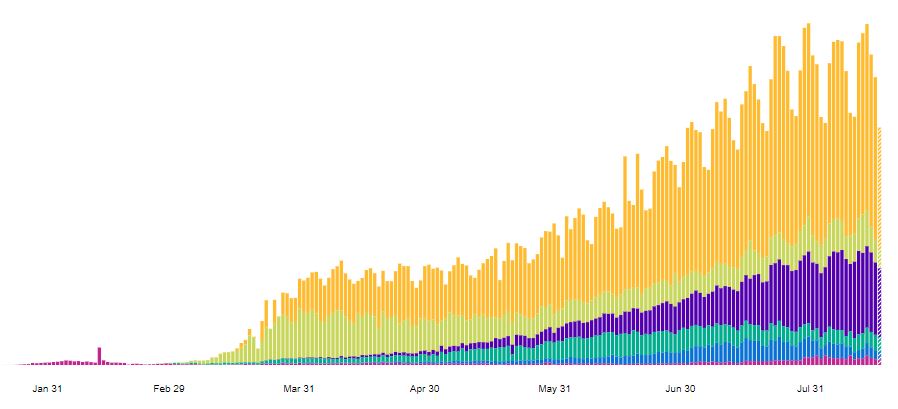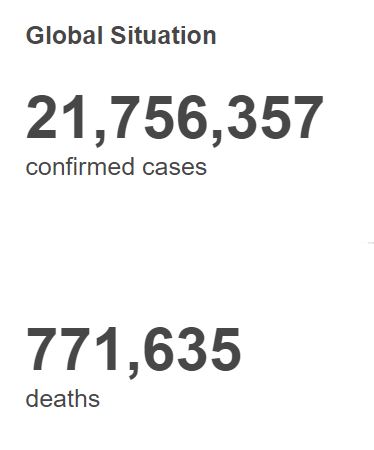Coronaviruses are a large group of viruses that can cause illnesses as minor as a cold, but in some cases the virus can be fatal. This outbreak is caused by a new strain of coronavirus (now called 2019-nCOV), which has not previously been seen in humans before the outbreak was reported in Wuhan, China in December 2019. By mid-August 2020, there have been 21,756,357 confirmed cases of COVID-19, including 771,635 deaths.

What are the symptoms of the new coronavirus?
Infection with the virus can cause mild symptoms like fever, cough, a runny nose and chills, however some people can have more severe illness leading to pneumonia and breathing difficulties. More rarely the disease can be fatal.
At present health officials are focused on trying to contain the virus from spreading whilst providing care to those who have been infected. This coronavirus is spread from person to person, usually after close contact with an infected person. There have been some early comparisons to Severe Acute Respiratory Syndrome (SARS), a coronavirus that also originated in China. Tragically, according to the World Health Organization (WHO), 774 people died during the 2002-2003 SARS outbreak. Another 8,098 people worldwide became sick.
How is the new coronavirus transmitted?
Although this coronavirus originally spread from animals to humans, it has now been confirmed that this strain of the virus can spread between humans, mainly via droplets from an infected persons’ mouth or nose when the person coughs or sneezes. The virus may also be spread by contact with surfaces that have been contaminated.
How did the new strain of coronavirus start?
The outbreak began in Wuhan, China—a city of 11 million people—in December 2019. Coronaviruses typically come from animals however investigations are ongoing as to how this virus originated and spread.
Cases have been confirmed in many provinces of China, Thailand, Taiwan, Malaysia, Vietnam, Japan, South Korea, India, Sri Lanka, Russia, the United States, Canada and in Europe and the Middle East, however the situation is changing rapidly.
How many people have been affected by the coronavirus?
Over 43,000 cases have been confirmed. The total number of confirmed deaths is 1018. Using data from the WHO and the Centre for Disease Control, the latest information on caseload is available from Johns Hopkins University here.
What's being done to stop the spread of the new coronavirus?
A number of public health measures are being taken to stop the spread of the virus. As of January 23, public transportation in Wuhan and some surrounding areas— including buses, subways and ferries— have been suspended. Travel in and out of Wuhan and surrounding areas has been suspended.
More recently, different airlines have suspended their flights to mainland China and some countries have imposed entry bans on travellers who have been to China in the 14 days prior to arriving in the country. Those arriving from China on direct flights to many other countries are being screened by health officials. Some countries have put in place extra safety measures such as thermal screening at ports and airports and passengers on flights from affected places are getting extra health checks.
Most importantly, the WHO emphasizes that the best way to avoid spread of the novel Coronavirus is to keep good hand hygiene (wash hands often with soap, or, if unavailable use alcohol rub) and good cough etiquette (use paper towel to cough/sneeze in and discard of the tissue properly, or cough/sneeze in a flexed elbow) and safe food practices and avoiding close contact, when possible, with anyone showing symptoms of respiratory illness such as coughing and sneezing.
Countries that have identified a person infected with the novel Coronavirus have reportedly isolated the person and closely followed up with any people who they had been in contact with to monitor their health.
What is the treatment for the new coronavirus?
To date, there are no specific treatments for the new coronavirus. Some treatments are under investigation and will be tested through clinical trials. The WHO is helping to coordinate efforts to develop medicines and vaccines to treat the virus with a range of partners.
All those affected should receive appropriate care to relieve and treat symptoms, such as medicines to relieve the fever and cough and cold symptoms. Patients with more severe illness may require more specialised care such as antibiotics and treatment with oxygen.
To protect yourself from getting infected with the new coronavirus, you should maintain basic hand and respiratory hygiene, safe food practices and avoiding close contact when possible with anyone showing symptoms of respiratory illness such as coughing and sneezing.
What kind of precautions should people take?
The WHO’s standard recommendations for the general public to reduce exposure to and transmission of a range of infectious illnesses are:
- Hand and respiratory hygiene such as washing your hands regularly
- Covering your mouth when coughing and sneezing
- Safe food practices,
- Staying at home if you are unwell
- Seeking medical advice early. Please refer to WHO’s websitefor details.
Public health advice about coronavirus is being updated regularly as we learn more about the virus. It is important to stay up to the date with the most relevant and correct information. This may include the steps needed to take to prevent infection, advice about travel and movement and which countries may be involved. It is important to note that although there is global WHO guidance, different countries have also instituted different measures for people returning from Wuhan and other affected countries and you may need to check what your local authorities are doing if this applies to you.
The incubation time of the virus is thought to be up to 14 days. Therefore, people who have been in contact with a confirmed case of novel Coronavirus are put under medical observation for 14 days. In some countries, travellers returning from affected areas who have not been in contact with a patient with coronavirus may also be quarantined and advised not to attend school, work or social events.
In addition, people who have travelled to and from certain affected countries are advised to monitor their health and temperature during travel and for 14 days post-travel and to seek medical attention immediately if they ae unwell, telling their health care provider about their travel and prevent exposing other people to infection (e.g. by wearing a mask whilst going to seek medical advice). Affected countries change regularly so stay up the date with the latest guidance (see websites below).

Which sources of information should I refer to for updates on coronavirus?
There is a lot of information out there about coronavirus at the moment. We encourage people to refer to reliable sources of information and be aware that advice may change regularly as we learn more about the virus. The following websites provide up to date information on the outbreak: WHO, US CDC novel coronavirus and European CDC .
I enjoy looking through your websites. Appreciate it!
Incredibly useful looking ahead to returning.